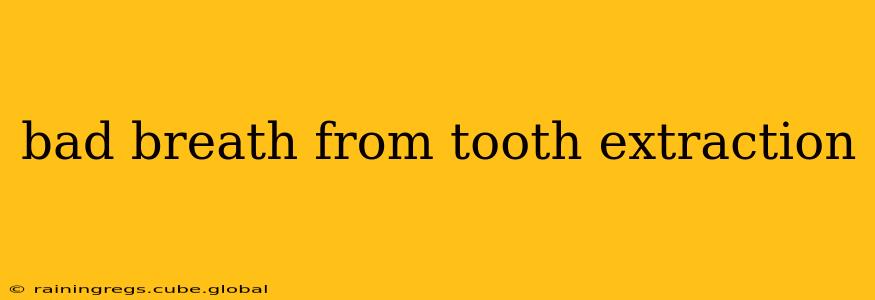Bad breath, or halitosis, is a common concern after a tooth extraction. While it's often temporary, understanding its causes and how to manage it can significantly improve your post-operative comfort and recovery. This comprehensive guide will explore the reasons behind post-extraction halitosis, effective prevention strategies, and when to seek professional dental advice.
Why Does My Breath Smell Bad After a Tooth Extraction?
Several factors contribute to bad breath following a tooth extraction. These include:
-
Blood Clots: The initial formation of a blood clot in the extraction socket is crucial for healing. However, decomposing blood can temporarily cause a foul odor. This is usually temporary and resolves as the clot stabilizes.
-
Food Debris: The extraction site is vulnerable and can easily trap food particles. These decaying remnants contribute to bacterial growth, leading to bad breath. Careful cleaning and rinsing are essential to prevent this.
-
Infection: In some cases, an infection can develop at the extraction site. This is a serious complication characterized by persistent bad breath, along with pain, swelling, and potentially fever. Immediate professional attention is required if you suspect an infection.
-
Dry Socket: Also known as alveolar osteitis, a dry socket occurs when the blood clot dislodges from the extraction site prematurely. This exposes the bone and nerve endings, causing severe pain and a distinctly unpleasant odor.
-
Oral Hygiene Practices: Poor oral hygiene, even before the extraction, can contribute to lingering bad breath. Existing bacteria in the mouth can multiply readily in the altered oral environment following the procedure.
How Can I Prevent Bad Breath After a Tooth Extraction?
Proactive measures can minimize the risk of post-extraction halitosis:
-
Maintain Excellent Oral Hygiene: Gentle brushing and rinsing (with a prescribed mouthwash if provided) are crucial. Avoid aggressive brushing or rinsing near the extraction site to prevent dislodging the blood clot.
-
Follow Post-Operative Instructions Carefully: Your dentist or oral surgeon will provide specific instructions regarding rinsing, cleaning, and diet. Adhering to these is paramount for preventing complications, including bad breath.
-
Eat a Healthy Diet: Avoid strong-smelling foods and those that can easily get trapped in the extraction site. Soft, easily digestible foods are recommended in the initial post-operative period.
-
Stay Hydrated: Drinking plenty of water helps flush out food particles and bacteria, promoting oral hygiene and reducing bad breath.
-
Avoid Smoking and Alcohol: Both significantly impair healing and increase the risk of infection and dry socket, both of which can lead to persistent bad breath.
What Should I Do If I Have Bad Breath After a Tooth Extraction?
While temporary bad breath is usually not a cause for alarm, persistent or worsening bad breath warrants attention:
-
Gentle Rinsing: Use a prescribed mouthwash or a saltwater rinse (1/2 teaspoon salt in 8 ounces of warm water) to gently clean the area.
-
Monitor for Infection Signs: Pay close attention to signs of infection, such as increasing pain, swelling, redness, or fever. Contact your dentist or oral surgeon immediately if these symptoms arise.
Is Bad Breath After a Tooth Extraction a Sign of Infection?
Persistent bad breath accompanied by pain, swelling, or fever could indicate an infection. While a mild, temporary odor is often normal, a progressively worsening smell warrants immediate consultation with your dentist or oral surgeon. They can assess the situation and provide appropriate treatment.
How Long Does Bad Breath Last After a Tooth Extraction?
The duration of bad breath varies, typically lasting a few days to a week. However, if it persists beyond this period or worsens, it's essential to consult a dental professional to rule out complications.
When Should I Call My Dentist After a Tooth Extraction?
Contact your dentist or oral surgeon immediately if you experience:
- Severe or persistent pain
- Excessive bleeding
- Swelling that increases significantly
- High fever
- Persistent bad breath accompanied by other symptoms
By understanding the causes of post-extraction bad breath and taking preventive measures, you can ensure a smoother recovery and a fresher smile. Remember, proactive care and prompt attention to any worrisome symptoms are key to maintaining optimal oral health.
